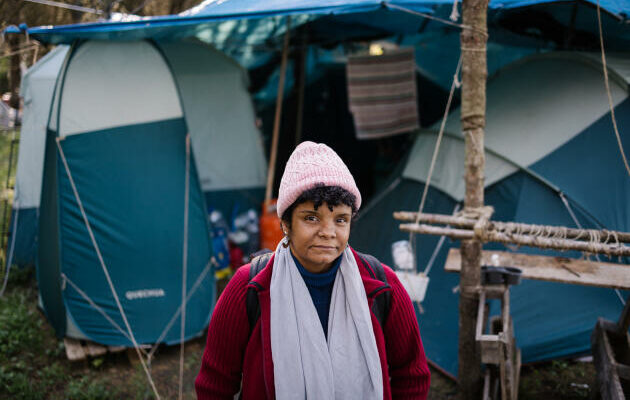It is 8:30 a.m. this Wednesday, February 28, and, one by one, men and women make their way, at irregular intervals, under the trees of the Quinta dos Ingleses park, in Lisbon. With sleepy eyes, they leave their tent. After crossing the wasteland facing Carcavelos beach, popular with surfers, and passing the posh British private school St Julian’s School in front of which luxury cars parade, they reach the train station to get to their work, in Lisbon.
“ I had to pay 400 euros per month for a room in the city, which, with my salary of 800 euros, barely left me enough to live on”, explains Andreia Costa, 49, Brazilian carpenter and cleaner in Lisbon tourist apartments. Having lived in Portugal for a year and a half, she came to pitch her tent at Quinta dos Ingleses in September 2023, after hearing about it from a friend. “I established a strategy and made this decision with one objective: to be able to save money to buy a caravan in which to live with dignity. »
If the Portuguese government increased the minimum wage by almost 8% in 2024, bringing it to 820 euros per month (for fourteen months per year, or 950 euros over twelve months), increasingly close to the average salary (1,050 euros net), rents have soared by more than 20% in 2023 in the capital, according to statistics from the real estate portal Idealista. In three years, rental prices have jumped by 50%, and doubled in seven years.
Nailed to a tree, a sign indicates the entrance to Andreia’s camp, which she has ingenuously named the “brown campers’ condominium” and which she shares with a friend, a cook. The latter, Marcia Alvaro, 42, previously rented a bed in a room for 250 euros per month. Now, everyone lives in one of the two large tents facing each other. They have set up a kitchen with gas stoves and a precarious shower under a vertical tent where there is a bucket, filled from the river.
“The city is no longer for us”
Like them, more than thirty precarious workers, mainly Brazilians, but also a few Portuguese and an Angolan, have chosen to live in a tent, around twenty kilometers north of Lisbon, rather than spending most of their their meager salary for precarious housing. Nelson Figueira, 21, starts a new job as a salesman, after a few months as a construction worker. Habi, a metalworker, already left an hour ago, explains his wife, Suazi Viegas, 36 years old. Six months ago, the couple left the one-bedroom apartment they shared with five other people in Lisbon for 400 euros a month, preferring to live in a tent to the promiscuity and lack of privacy that their low income imposed on them.
You have 60.02% of this article left to read. The rest is reserved for subscribers.
